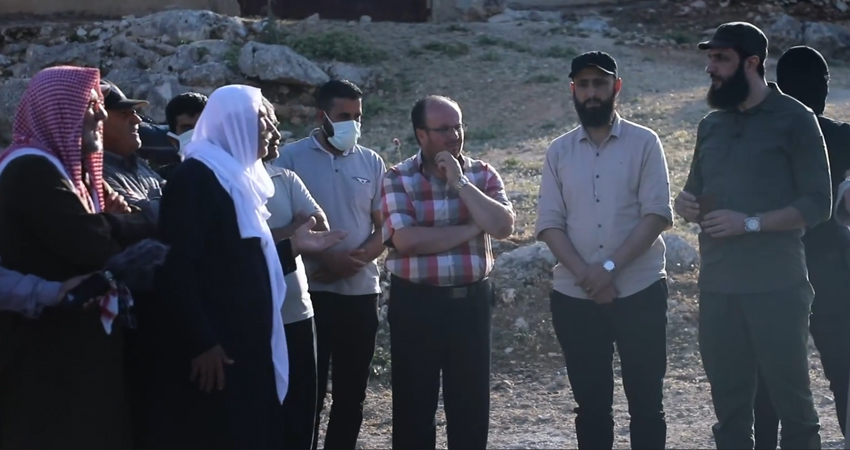Ninar Khalifa
“Earlier this year, unidentified assailants kidnapped one of my relatives, who was a well-known food merchant, while leaving his home in Jabal al-Summaq, rural Idlib, to Idlib city. Kidnappers contacted his family several days after his disappearance, demanding a huge ransom — more than all his wealth”, said Hazem (a pseudonym for security reasons), to Syrians for Truth and Justice (STJ) as he described what happened to his relative, whose life was turned upside down after being kidnapped by still unknown assailants.
“My relative’s family entered negotiations with the kidnappers that lasted a week and resulted in the latter reducing the ransom to an amount which was still large but affordable. The family put the amount in a place they agreed upon with the kidnappers; my relative was released the next day. Following this incident, my relative left his village with his wife and little children towards regime-held areas, leaving his property behind for his relatives to look after.”
Hazem’s relative described the kidnappers. “They were bearded,” he said. “Not all of them spoke Arabic; some used a strange language that I could not recognize. One of them told me in the Idlib dialect that capturing me was not a kidnapping for ransom, but the amount they asked was for supporting cells trying to overcome injustice and tyranny in order to ensure the victory of right over might in northern Syria. He justified that they use these methods to gain money because they refuse to submit to any donors or factions that may control them and their decisions in return for support.
| Between January and August 2022, The Syrian Network for Human Rights (SNHR) documented no less than 53 kidnapping cases in Druze-majority villages of Idlib. Three of the cases were of children and one of a woman.
The perpetrators: The Islamic State (aka: Daesh or IS): 16 cases Hay’at Tahrir al-Sham (HTS): 23 cases Other extremist Islamic organizations: 14 cases |
According to STJ’s monitoring and verification, the Unitarian Druze Community in Jabal al-Summaq in northwestern rural Idlib is suffering instability due to continuing kidnappings, killings, property confiscations, and discrimination in access to rights and opportunities on a sectarian basis.
On 22 August, the elderly Druze couple Turki Bias, 70, and Huda Zaki Zebar, 65, were found murdered under mysterious circumstances in the village of Keftin. This incident rekindled discussions about violations against the Druze and prompted questions about how Druze villages were being protected, especially after most of their local residents abandoned them because of recent exposure to violations and harassment. In 2015, Jabal al-Summaq witnessed a horrific massacre when a Tunisian leader of Al-Nusra Front/Jabhat al-Nusra (aka Jabhat Fatah al-Sham) called Abu Abd al-Rahman al-Tunisi, and his fighters gunned down at least 20 Druze residents in the village of Qalb Loze.
In a statement, Al-Nusra claimed that the massacre was an “inexcusable mistake” perpetrated by its members without a permission from their leaders.
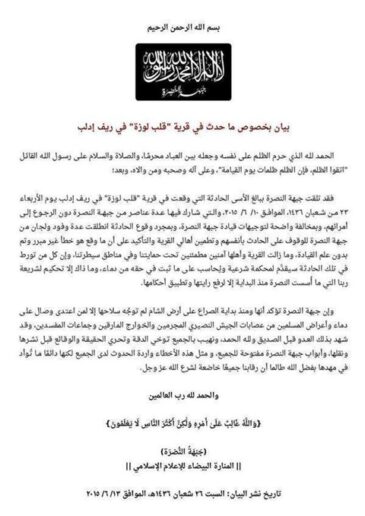
Image 1- A copy of Al-Nusra statement on the Qalb Loze massacre.
| The real name of the director of the Qalb Loze massacre is Abdel Salam Sharif, nicknamed al-Safinah al-Tunsi, who hails from Tunisia’s Bizerte.
Al-Tunsi defected from Al-Nusra after it split from Al-Qaeda in 2016. In mid-April 2021, HTS clashed with al-Tunsi in Kafr Dariyan in northern rural Idlib, and killed him along with leaders of the Guardians of Religion Organization/Hurras al-Din faction after their involvement in the murder of Fayez al-Khleif, Minister of Higher Education in HTS’s Salvation Government. A photo of al-Tunsi, taken in September 2016, was later circulated, raising doubts about his death. |
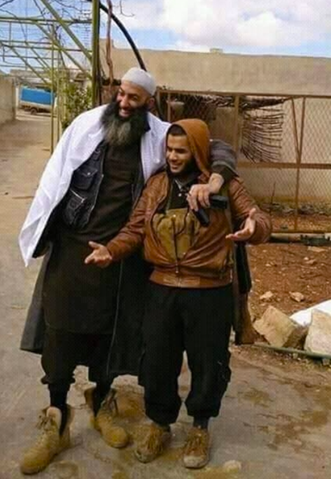
Image 2- Abu Abd al-Rahman al-Tunisi (left). Taken; September 2016. Credit: Ayman Jawad al-Tamimi.
Forced Conversion to Islam
Abdul Majeed Sharif, a political activist from Jabal al-Summaq, spoke to STJ about the harassment of the Druze community, saying:
“Many people from the Jabal al-Summaq villages have been kidnapped, and only one was released. Leaders of different armed groups in the area met and decided to ask us to choose between abandoning Druze beliefs and converting to Islam or being killed. The Druze Sheikh Akl caved in to the pressures and declared the area Islamic in a statement which went out to the media. After expelling the Syrian Army from Idlib, Al-Nusra took over our villages and placed them under the rule of Abu Abd al-Rahman al-Tunisi, nicknamed al-Safinah. Al-Tunisi’s ruling period was a dark time; he humiliated the Druze and desecrated their shrines. This period witnessed a surge in kidnappings, killings, and arrests; no one got out alive after being detained. However, al-Tunisi’s most heinous act was the Qalb Loze massacre.”
Sharif added that pressures on the people continued after the removal of al-Tunsi, albeit less severe. Al-Nusra focused on monitoring the execution of the Islamic rituals as well as gaining money from extortion.
| HTS banned the Druze from practicing their religious rituals by closing their shrines and forcing them to go to mosques.
The SNHR. |
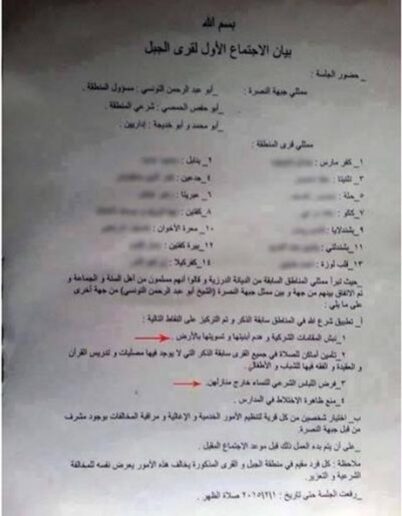
Image 3- A copy of the statement of the first meeting in Jabal al-Summaq attended by a number of Druze notables and Al-Nusra’s Abd al-Rahman al-Tunisi, the area officer, Abu Hafs al-Homsi, the area’s Sharia advisor, as well as the administrative staff, Abu Muhammad and Abu Khadija. The statement reads the decisions of the meeting, including: “The representatives of the Druze villages left Druzism and declared themselves Muslims of Ahlu Sunnah Wal Jama’a, the application of God’s law in the aforementioned regions, the destruction of Circassian shrines, the imposition of Sharia dress, and the prevention of mixed schools.” Credit: Ayman Jawad al-Tamimi.
Warnings of a New Massacre
Abdul Majeed Sharif, a political activist from Jabal al-Summaq, warned STJ that increasing violations might portend another massacre. He described several of the violations the community was experiencing:
“In early August, the shepherd, Hikmat Hadad, was murdered near the village of Kuku. The reason behind his killing was vague since he did not have disputes with anyone; and as a poor shepherd, his killing could not be motivated by robbery.”
On 12 August, Sharif sent out a distress call in a Facebook post, claiming that the Turkistan Islamic Party (TIP) had been increasingly harassing local Druze, especially those of Qalb Loze, in actions which threatened another massacre.
“Despite outcry, violations continued against the people of Qalb Loze villages. In one instance, foreign fighters aggressively targeted worshippers in a mosque in the village of Qalb Loze. Fighters entered a mosque before Friday prayers, one of them shouting: ‘You are Druze, you are infidels’. His comrades prevented him from loading his rifle,” Sharif wrote.
“Before that, they entered several houses and beat their owners. The residents cannot deter them, and we fear that they will commit a new massacre in the area. In the event that happens HTS will be to blame, as it is responsible for the area’s security,” Sharif added.
Sharif went on to observe that the HTS responded to his call by sending a military force to Qalb Loze village, which helped to calm the people a little. However, two days later, a couple was shot dead while returning home at night.
On 24 August 2022, two days after the murder, the General Security Service operating in Idlib announced in an official statement that the two perpetrators had been arrested, and they were two Uzbeks with links to IS. The General Security Service claimed that the two convicts confessed to the murders of the couple and the shepherd as well as other crimes and published photos of them on its official Telegram account.
Sharif ruled out that the two Uzbeks perpetrated any of the murders that occurred in the Druze villages, alleging that the Security Service framed them falsely in order to close the crime files publicly.
For its part, the TIP refuted accusations that its members were attacking the Druze of Jabal al-Summaq, declaring in a statement that it distances itself from any “internal problems”.
| Barisha, Al-Jabal al Gharbi, and Jabal al-Summaq are all names given to the mountainous region and its plain outskirts in Harem city located about 20 km northwest of Idlib, at the Syrian-Turkish borders.
The region was later called “Jabal al-Summaq”, due to the abundance of forest sumac bushes. Jabal al-Summaq includes two mixed villages (Sunni Muslims and Druze), and eighteen small Druze villages that had populations of about 30,000 people before 2011. The Syrian war affected the demographic distribution of Jabal al-Summaq. Most of its inhabitants fled the hostilities to Damascus and Suweida, or sought asylum abroad in Turkey, Lebanon, and Europe. On the other hand, the early years of Syria’s ongoing civil war has seen tens of thousands of fighters and civilians displaced into the Jabal al-Summaq from neighboring villages that were subjected to daily bombardment by the Syrian regime and its allies. |
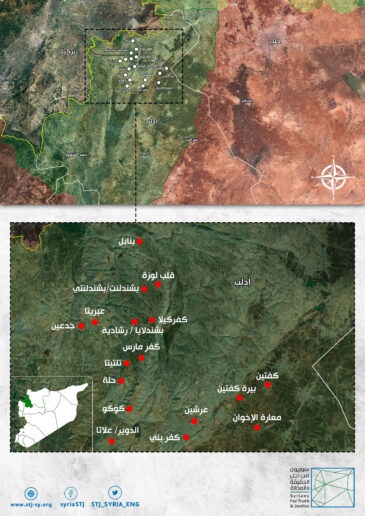
Image 4- A map illustrates the Druze villages in Jabal al-Summaq, Idlib, and the lines of the rebels’ military control in November 2022.
Property Seizures
Tariq (a pseudonym) had his home and agricultural land seized after Al-Nusra took over Jabal al-Summaq, under the pretext that he is “shabih”, or a regime supporter. Tariq recounted:
“I am an employee in the Ministry of Electricity of the Syrian government in Damascus. With the onset of the conflict in Syria, I rented a house in Jaramana, rural Damascus. I used to visit my village from time to time, but when the military checkpoints intensified on the roads, I stopped going. I entrusted my land to my brother to care for and sell its harvest. He sent me the crop prices until 2013.
After entering the village, Al-Nusra Front seized my home, writing ‘confiscated’ on its walls. When my brother asked them why, they answered that it was because I am a ‘shabih’ living in regime areas. My brother tried to explain my situation but they did not listen. In 2016, Al-Nusra settled a Turkistan fighter in my home and he still living there with his family.”
Tariq confirmed that Al-Nusra also seized land in 2018 and gave it to an Albanian fighter who benefits from its crops to this day. Tariq’s brother filed a complaint to an HTS court to reclaim Tariq’s home but the case was not considered. Nonetheless, when the fighter who was settled in the house learned about the complaint, he sent Tariq’s brother a threat saying: “I will not leave the house, and if you try to disturb me or cause me trouble, the ‘infidel’ of you will cost me a bullet.”
These events occurred even despite the Salvation Government’s decision to return properties confiscated from absent owners to the original owners or their first-degree relatives. According to Tariq, this decision resulted in no real benefits due to its vague application requirements. The decision required the owner to be not “shabih”, which is a loose term, and also required the owner to file the complaint personally. However, it is impossible for many of the owners to return to their villages due to blocked official roads and dangerous smuggling routes.
Since early 2021, the Salvation Government has succeeded to return few of the confiscated properties. Much of the confiscated property remains in the hands of HTS’ influential leaders, who are not willing to give it up voluntarily, as The Syria Report website reported.
Furthermore, the Salvation Government conditioned obtaining security clearances for initiating transactions of the sale or transfer of property. Such a condition hampers the owners’ freedom to dispose of their properties, especially since the issuance of security clearances may be applied in a discriminatory manner, as it is subjected to considerations relating to the owner’s ideological and political orientations.
| The Independent International Commission of Inquiry on the Syrian Arab Republic confirmed in its last report dated on 14 September 2022 that it continued to receive reports on HTS’ seizure of private properties between 1 January and 30 June 2022.
Reports indicated that, through a general directorate for housing affairs (previously known as the Committee on the Spoils of War), the group allocated properties of absentee owners to its fighters or rented them out to displaced families. Several agents were allegedly appointed by the group across the governorate to collect rent, manage property contracts, and identify newly vacated homes in the area. Properties owned by displaced individuals perceived to be supporting the Government or opposing HTS, including Christians, were primarily targeted for confiscation. The confiscations described may amount to the war crime of pillage. Property rights of displaced persons are specifically protected under customary international humanitarian law and must be respected by all parties, free from discrimination. |
Since the onset of the Syrian war, thousands residents of Jabal al-Summaq displaced to Lebanon or to safer Druze-majority areas inside Syria, including As Suwayda province in the south and Jaramana city in Damascus countryside. This helped the armed groups in control to seize a large number of abandoned homes.
The SNHR estimates that today’s population of Druze villages is only 20% – mostly elderly – of that before 2011. The SNHR noted that 50% of these Druze villages’ populations were displaced between 2012 and 2014, when pro-regime forces intensified their bombardment of the area and then hardline militants took over.
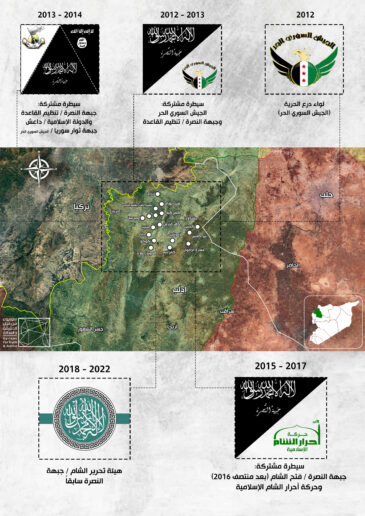
Image 5- The successive military authorities on Jabal al-Summaq from 2012 to 2022.
Discriminatory Treatment
According to witnesses, the Druze of Jabal al-Summaq suffer from restrictions and discrimination that deprive them of their rights.
Sharif confirmed: “The ruling military authority grants jobs and privileges only to people loyal to it, including the informers and the propagandists of HTS. The number of Druze employees in the authority’s institutions can be counted by hand.”
Yazan (a pseudonym), a resident of Jabal al-Summaq, spoke to STJ about his attempt to apply to joining HTS’ Civil police, saying:
“I, along with some of my friends, submitted to join the HTS’ Civil Police and serve in Jabal al-Summaq. We thought that by being part of the decision-making system, we could protect our people and livelihood on the one hand and contribute to alleviating the severity of the problems and violations in the region on the other. However, when we told the employee who was filling our applications about our place of birth, he realized we are Druze. He asked why we wanted to join HTS. When we told him our reasons, he said: ‘You are not Muslims and it is not permissible for you to run Muslims’ affairs.’ Thus, we asked him if we could serve to manage the Druze’s affairs; he answered: ‘We can do it all. Go back to your farm work; do not bother yourselves, we will take care of your affairs’.”
Yazan claimed that it is impossible to find a person from Jabal al-Summaq hired in the Civil Police or any other institution of the Salvation Government. Many of the region’s youth who submitted their CVs were never contacted despite meeting the job requirements.
Moreover, Sharif confirmed that the Druze are prohibited from possessing weapons, even those attributed to personal protection or hunting.
To say more on this, Mamdouh (a pseudonym) testified to STJ that the Salvation Government police confiscated his hunting rifle. This was after he fired one shot in the air when he suspected a thief was in his livestock stable.
Mamdouh explained: “One night I heard movement in my cows’ stable. I hurried out and saw a man inside the stable and a large vehicle waiting for him outside. At this point, I fired a bullet in the air from my hunting rifle. The thief ran to the car and fled, taking nothing. The next day, the police confiscated my gun and imposed a fine of 25,000 Syrian pounds (SP); they also threatened to arrest me if I used a weapon again. I explained to the police that I used the rifle to protect my family and livelihood. They replied: ‘You do not have to possess a weapon; we are here to protect you’.”
Mamdouh pointed out that there has been an increase in home and land robberies recently, and there is currently no functioning emergency line to the police.
Promises of Reparations and Reforms
On 9 June, an HTS leader, Abu Mohammad al-Julani, met with Idlib’s Druze in Jabal al-Summaq at the opening of a water well and promised to improve services and to address grievances.
Al-Julani, along with HTS commanders and SSG officials, listened to the demands of the Druze residents, which included the restoration of the medical center in Talteta village and the redress of grievances that befell a large number of people in the region.
One of the notables told al-Julani: “Our first and most important demand is to be treated equally with others. We do not want to be considered a sect. We are Muslims. We entered Islam with dignity and pride and we refuse to be other than Muslim or to be described in any other way.”
Al-Julani interrupted the notable, mentioning the Qur’anic verse: “There is no compulsion in religion”. Al-Julani stressed that there is no need to force anyone to embrace Islam. The latter also apologized indirectly for the Qalb Loze massacre and tried to deny HTS’ responsibility for the recent violations committed against the Druze: “We are righteous. We do not accept injustice against anyone. You will receive your rights at your doorsteps. You are the rightful inhabitants of this area; you have been here for thousands of years.”
Al-Julani’s claims to residents contradict his statements to the Doha-based channel Al Jazeera in 2015, in which he stressed the need to send Islamic preachers to the Christian and Druze villages in Idlib countryside to advise them give up their false religions and join Islam, believing that Christians would submit to Islamic rule in the event of an Islamic regime in Syria.
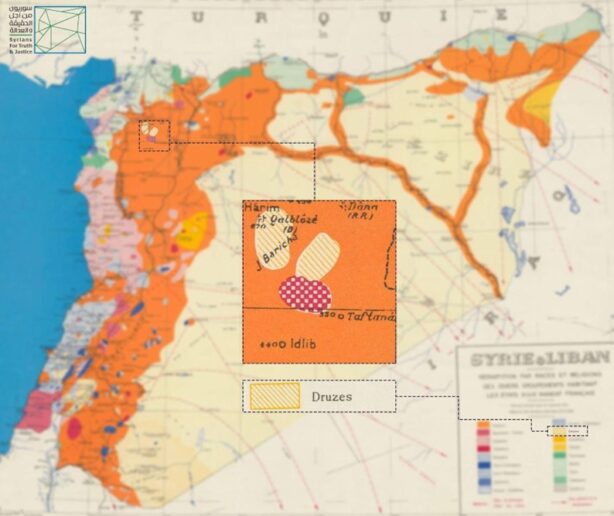
Image 6- A map illustrates the distribution of the ethnic and religious communities in Syria and Lebanon in 1936 confirming the ancient presence of the Druze in Idlib. Credit: Gallica.
Legal View
A Syrian judge, Riyad Ali, explained to STJ how the aforementioned violations breach a number of local and international laws.
Ali said that International Humanitarian Law (IHL) obliges all parties to the conflict to protect civilians – regardless of their affiliations – as long as they do not participate directly in hostilities. In the same vein, Article 3, common to the four Geneva Conventions of 1949, requires humane treatment for all persons in enemy hands, without any adverse distinction. Furthermore, non-discrimination is one of the rules of customary International Humanitarian Law (Customary IHL).
Acts and practices that discriminate against specific groups of the population are considered adverse distinctions that cannot be justified by sect, religion, or civil office to which the members of that group belongs or practices. The main factor that determines the lapse of IHL protection is the individual’s direct participation in hostilities.
Criminalization of Kidnapping
Ali stressed that the Syrian Penal Code considers kidnapping and arbitrary deprivation of liberty for ransom as criminal offences. The Code prescribes a penalty of detention for a period of six months to two years for anyone who in any way deprives another person of his personal liberty. Furthermore, the Code imposes a term of hard labor on the perpetrator in case the person who was forbidden freedom was subjected to physical or mental torture, or if the act was committed against an official during the course of his/her duties (Articles 555-556).
Article 1 of the Legislative Decree No. 20 of 2013 set out the penalties for kidnapping offences, which range from a life sentence of penal labor to the death penalty. The penalty depends on the motive behind the kidnapping. If the motivation is for political or material gain, revenge, sectarian reasons, or ransom, the offence is punishable by a life sentence of penal labor. If the kidnapping results in the death, serious injury, or sexual assault of the victim, the offence is a capital offence and punishable by death.
The provisions of IHL also forbid hostage-taking, which is enshrined in Article 3, common to the four Geneva Conventions of 1949, as well as Rule 96 of Customary IHL. Furthermore, the act of hostage-taking may amount to a war crime according to Article 8 of the Rome Statute of the International Criminal Court of 1998. Article 1 of the 1979 International Convention Against the Taking of Hostages defines the act of hostage-taking as:
“any person who seizes or detains and threatens to kill, to injure or to continue to detain a hostage in order to compel a State, an international intergovernmental organization, a natural or juridical person, or a group of persons, to do or abstain from doing any act as an explicit or implicit condition for the release of the hostage. Any person also commits such an offence if that person attempts to commit an offence as set forth above or participates as an accomplice of anyone who commits or attempts to commit an act of hostage-taking.”[1]
The act of arbitrary deprivation of liberty in itself is prohibited according to Rule 99 of Customary IHL as well as Article 9.1 of the International Covenant on Civil and Political Rights (ICCPR) of 1966 which states: “Everyone has the right to liberty and security of person. No one shall be subjected to arbitrary arrest or detention. No one shall be deprived of their liberty except on such grounds and in accordance with such procedures as are established by law.”
Protection of Property Rights
Regarding the arbitrary property seizures, Ali confirmed that the right to property is a basic human right enshrined in international covenants and conventions and is closely linked to the right of every person to live with safety and dignity. Ali stressed that under no circumstances is it acceptable to take someone’s property unjustly.
This right was affirmed in Article 17 of the Universal Declaration of Human Rights of 1948. In addition, the Guiding Principles on Internal Displacement emphasizes in Principle 21 that:
“1. No one shall be arbitrarily deprived of property and possessions.
- The property and possessions of internally displaced persons shall in all circumstances be protected, in particular, against the following acts:
(a) Pillage;
(b) Direct or indiscriminate attacks or other acts of violence;
(c) Being used to shield military operations or objectives;
(d) Being made the object of reprisal; and
(e) Being destroyed or appropriated as a form of collective punishment.”
Moreover, protecting property and possessions of internally displaced persons is a binding obligation on all parties of a conflict regardless of their legal status, as stipulated in Customary IHL.
The Al-Nusra/HTS’ practices of seizing private properties and forcing their owners out, blatantly violate the aforementioned international covenants and conventions. Such practices may amount to a war crimes and crimes against humanity in the sense of Articles 8.2.e.xii and Article 7.1.d of the Rome Statute of the International Criminal Court of 1998, which entered into force in 2002.
Article 8.2.e.xii:
“2. For the purpose of this Statute, ‘war crimes’ means:
(xii) Destroying or seizing the property of an adversary unless such destruction or seizure be imperatively demanded by the necessities of the conflict.”
Article 7.1.d:
“1. For the purpose of this Statute, ‘crime against humanity’ means any of the following acts when committed as part of a widespread or systematic attack directed against any civilian population, with knowledge of the attack.”
In addition, the appropriation of the property of others, movable or immovable, by any party, constitutes an explicit violation of Article 15 of the 2012 Syrian Constitution in force, which states:
- “Private ownership shall not be removed except in the public interest by a decree and against fair compensation according to the law.”
- “Confiscation of private property shall not be imposed without a final court ruling.”
The arbitrary seizure of private properties infringes the right of the legal owners to freely dispose their properties as stipulated in Article 770 of the Syrian Civil Code:
- “The owner has the exclusive right to use, exploit and dispose of this property within the limits of the law.”
- “The owner of a thing has the right to all its fruits, products and accessories unless there is a text or agreement to the contrary.”
Appropriation or confiscation of private properties cannot be justified by the owner’s loyalty to one of the parties to the conflict, because the right of ownership is legally preserved regardless of the owner’s political orientation.
Unacceptable Discriminatory Practices
Ali affirmed that international law rejects ruling powers’ practices that involve discrimination against any individual or group. The 1948 Universal Declaration of Human Rights states: “All are equal before the law and are entitled without any discrimination to equal protection of the law. All are entitled to equal protection against any discrimination in violation of this Declaration and against any incitement to such discrimination.” The Declaration’s 23rd article claims: “Everyone has the right to work, to free choice of employment, to just and favorable conditions of work and to protection against unemployment.”
Furthermore, the Rome Statute of the International Criminal Court provides in Article 7 that there can be no persecution against any identifiable group or collectivity on political, racial, national, ethnic, cultural, religious, gender, or other grounds, as such acts may amount to crimes against humanity when committed as part of a widespread or systematic attack directed against any civilian population.[2]
It is now well established in international law – in theory and practice – that armed non-State actors empowered to exercise governmental authority or acting with government acquiescence are subject to the obligations of IHL. Thereby, the Al-Nusra/HTS, which exercises in practice effective control of the areas under their influence, cannot evade IHL obligations.
HTS’ Fluctuating Behavior
Orwa Ajjoub, a senior analyst specializing in jihadi groups at COAR Global believes that the violations in Jabal al-Summaq against the Druze cannot be considered systematic, especially today explaining:
“It is important to understand the historical context in which these violations happened. Between 2012 and 2016, Al-Nusra was a highly extremist faction. It included then hardline foreign fighters and leaders and had links with Al-Qaeda and Daesh. During this period, Al-Nusra leadership tended to radicalism and leaned to appease its foreign branches. That is why the leadership of Al-Qaeda did not take any disciplinary action against Safinah al-Tunisi after he committed the massacre against the Druze at the time.
Between 2016 and 2017, Al-Nusra severed its links – ideological, intellectual, organizational, and otherwise – with the global jihad and turned to locality. It then changed its name to HTS and worked towards shaping itself as a small state seeking to provide governance for all regardless of their religious and ethnic affiliations. As such, after 2017, the HTS had a tendency to change the way it deals with minorities in the region, including the Druze community.
However, we still hear from time to time about incidents of harassment against the Druze perpetrated by the foreign arms of HTS, such as the TIP. Nevertheless, that does not deny HTS’ efforts to safeguard the rights of minorities. I believe that there were two purposes behind this HTS move. The first was to solidify its rule through cooperation with all the residents of the region, and the second was to whitewash its history and send a message to the West that it is not a sectarian faction. HTS has been eradicating its extremist current since 2017. This resulted in a large number of defections among its more extremist members. I suggest that HTS has become a pragmatic group that is ready to work on any plan that serves its project.
The de facto authority is prepared to do anything, whether for minorities or others, in order to preserve its power and to send a message to the West that HTS is a viable state project in Idlib not only a Sunni faction that wants to dominate the region.”
[1] It should be noted that Syria is not a party to this treaty, but the definition contained therein is accepted and used globally.
[2] The Rome Statute of the International Criminal Court defines ‘persecution’ as: “The intentional and severe deprivation of fundamental rights contrary to international law by reason of the identity of the group or collectivity;”

